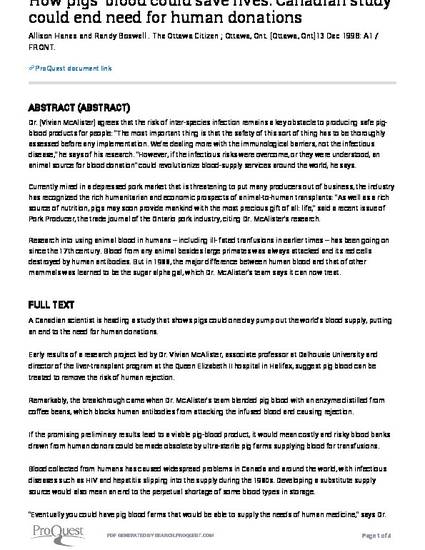
Popular Press
How pigs' blood could save lives: Canadian study could end need for human donations
The Ottawa Citizen
(1998)
Abstract
Dr. [Vivian McAlister] agrees that the risk of inter-species infection remains a key obstacle to producing safe pigblood products for people: "The most important thing is that the safety of this sort of thing has to be thoroughly assessed before any implementation. We're dealing more with the immunological barriers, not the infectious disease," he says of his research. "However, if the infectious risks were overcome, or they were understood, an animal source for blood donation" could revolutionize blood-supply services around the world, he says. Currently mired in a depressed pork market that is threatening to put many producers out of business, the industry has recognized the rich humanitarian and economic prospects of animal-to-human transplants: "As well as a rich source of nutrition, pigs may soon provide mankind with the most precious gift of all: life," said a recent issue of Pork Producer, the trade journal of the Ontario pork industry, citing Dr. McAlister's research. Research into using animal blood in humans -- including ill- fated tranfusions in earlier times -- has been going on since the 17th century. Blood from any animal besides large primates was always attacked and its red cells destroyed by human antibodies. But in 1988, the major difference between human blood and that of other mammals was learned to be the sugar alpha gal, which Dr. McAlister's team says it can now treat.
Keywords
- xenotransfusion
Disciplines
Publication Date
December 13, 1998
Citation Information
Allison Hanes and Randy Boswell. "How pigs' blood could save lives: Canadian study could end need for human donations" The Ottawa Citizen (1998) Available at: http://works.bepress.com/vivianmcalister/268/
